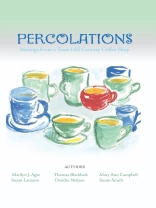Many a famous tale began with Once upon a Time. While yet others led off with It was a dark and dreary night. Each author, using these openings, was attempting to set the tone for his or her story and poem that followed. None of the stories or poetry that follow in this book set their tone with such epic or historic and yes sometimes hackneyed openings. Instead they all begin with what the individual author considered a fresh perspective on a subject of either his or her choosing or one chosen for him/her. In order to better understand this last statement, an explanation of how these authors came together to write such stories is required.
In 2005, Milli Thornton, the author of the book Fear of Writing, for writers & closet writers, established a writing group in a back room of Chickis Coffee Shop in the small Texas Hill Country community of Bulverde. Each Tuesday morning this eclectic group of would-be authors gathered, and over coffee and a variety of pastries would write for two hours. The two retired school teachers, a nurse and federal agent along with, an Irish lass, and an interior designer/artist would write their stories and poems from prompts offered by Thornton in her book or from other sources such as Texas Public Radio or Writers Digest.com. Making liberal use of their literary licenses, these writers crafted their pieces from these prompts by either embodying the entire prompt or selecting key words and or phrases from these prompts. On a number of occasions the single word the was chosen from the prompt and woven into a tale. Or the writers would choose a subject that was of importance to them at that moment. A tale from ones past; a rail against some minor injustice or poking fun at one of lifes inane situation became fodder for these authors.
Just as important as the prompt or fertile material as Thornton refers to them as, was the understanding that the stories and poems, when read at the conclusion of each weekly meeting, would not be negatively critiqued unless requested by the author. Instead, each participant would receive positive feed-back and encouragement on his or her works in hopes that it would inspire him/her to continue writing. The theory behind this kind of writing support can best be articulated in the words of Thornton when she discussed unleashing your imagination. She advised, The more you flex it the more limber it becomes. Positive reinforcement was intended to aid in the limbering effort, to encouraging them to continue to write and therefore become better writers.
That the theory proffered by Thorntons was effective one merely has to look at the limited success of several of the authors who have contributed to this book. Two authors submitted and had their short stories selected to be read on Texas Public Radio. One author received honorable mention in another short story competition. Another of this group of authors finished and published a novel and has completed another book that is being readied for publication. These accomplishments might have not been achieved had it not been for this writing group. Moreover, this book would have not been written had it not been for the desire and dedication of these authors who week in and week out continued to pour out their souls in their short stories.
Over the succeeding years, numerous writers passed through this group. Some moved on as their life situations changed; others needed something other than what was offered by the group. And still others, decided for personal reasons that the group did not satisfy their writing needs. What remained, was a constant core of writers who continued to meet and toil each Tuesday or whenever possible. The stories and poems contained in this book are the works of that core of writers. This group of writers hope that you, the reader, get as much joy from reading this collection of short stories as their authors did in creating them.
The book has been divided
Over de auteur
About the Author
Thomas (Tom) Blacklock was a U.S. Marine Vietnam Combat Veteran who went on to become a Special Agent and Supervisory Special Agent with the U.S. Drug Enforcement Administration (DEA) retiring after thirty years of Federal Service.












